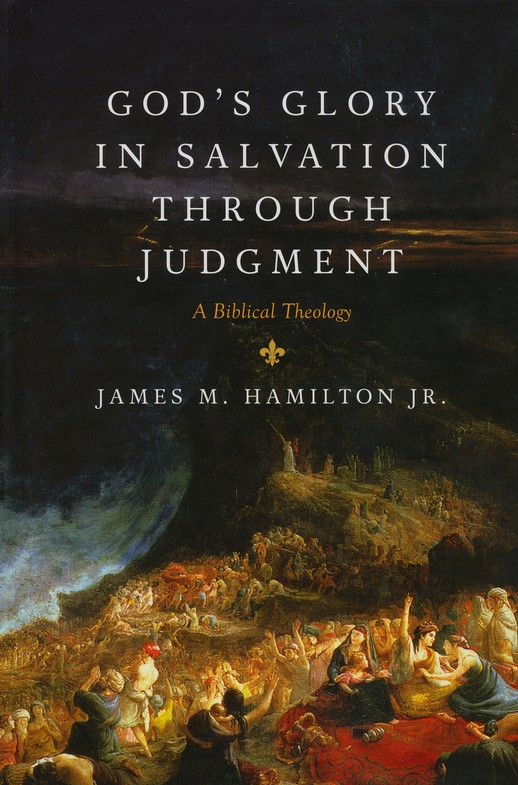While Hamilton’s book reads as a commentary throughout the canon, he effectively brings to mind his overall point. The center of biblical theology as God’s glory in salvation through judgment is the standing assertion of his book and it is an effective representation of his worldview about the reading of God’s holy words. Salvation as the soteriological purpose of the text concerns humanity’s interest toward the purpose of what God communicates through His appointed writers. However, while Hamilton touches on the meta-narratives adjacent to the plain meaning of Scripture, he does so from both horizontal and vertical perspectives. However, the important and pervasive subtext of scripture is that Christ was out to reclaim humanity and return it to the Creator by what He accomplished. The accession and triumph of Christ Jesus through His life, death, resurrection, ascension, and coronation, redeemed to God human creation that which is rightfully His. In the fulness of time, until all His enemies are made a footstool, the Kingdom was set to stand where the gates of hell shall not withstand it.
Through the timeless covenant of triadic love and unity, bearers of the Imago Dei would return to YHWH through means He appointed. From covenant to covenant, we see that unfold throughout the pages of scripture.
Hamilton’s conclusions in the last chapter of the book call readers to biblically centered ministry that involves intensive attention toward evangelism, discipleship, corrective church discipline, personal spiritual disciplines, bible reading, and prayer. This entire chapter is a refreshing perspective about what to do about biblical theology as it is developed within the hearts and minds of believers.
There were various places where I think he could have further developed some of his perspectives, but here are a few I noted.
- Hamilton could have elaborated more about the difference between a circumcised heart of the OT and the indwelling of the Spirit in the NT.
- Jesus’ gratitude for concealing revelation in some passages (Lk 10:21-22).
- N.T. Wright is cited (pg. 404), but he is a social gospel advocate. Meaning, Wright is on record where he wrote that salvation is attained through ecclesiological efforts. Hamilton’s work here is dated back to 2010, so I suppose it’s limited in terms of growing NPP advocacy.
Low View of Scripture within the Church
Hamilton’s book led me to buy another text written by Kevin Vanhoozer (details here) entitled, Hearers and Doers: A Pastor’s Guide to Making Disciples Through Scripture and Doctrine. I’m going to read that book because its sections are just so relevant today in a world of social chaos. It’s my limited view that, in general, the evangelical church in the West is an epic disaster. It is a ghetto of theological thought as its faith and practice are too often vacant of scriptural principles and imperatives. Have a close look at this year’s SBC convention (2022), for example. And the breakup of various denominations in recent years.
- Churches are largely social centers of well-being that are good for the local community and missions abroad for the gospel. Churches are a source of free volunteer labor for cities.
- Over the course of the last year, I’ve firsthand observed that in nearly every church I visited, attendees don’t bring a bible. The same is true by monitoring live-streamed services among very many congregations online. Podium Tedtalks wouldn’t have as much use of Scripture.
- You may have already seen this. It’s a research project involving about 400,000 participants. The research yielded the following conclusions:
Bible reading 1 day a week: No effect on participant
Bible reading 2 days a week: No effect on participant
Bible reading 3 days a week: Negligible effect on participant
Bible reading 4+ days a week: Pronounced effect that differentiated people of belief
Research demographics and details:
https://www.centerforbibleengagement.org/
https://www.backtothebible.org/research
Predominately, new and seasoned believers among all denominations don’t read their bibles. No exceptions. Therefore, they do not know God as well as they should (if at all).
It’s my view that the canon itself is inspired. In addition to the root text of Scripture. However, we let the words of our bible guide our convictions about spiritual development. Biblical theology deepens our understanding of what God meant by the Word written on the heart — to know the Lord personally and in a saving way distinct from cultural conditions historically among synagogues or churches. I’m aware of the LXX use among the apostles as their “bible”, the first century Hebrew Scripture, as well as the development of scrolls and codices to pixels.
God’s Word written on the hearts of His people is a fruit of the new covenant (Jer 31:33, Heb 10:16). It’s also my view that the condition of the modern evangelical church is pretty bleak. Largely because very many don’t recognize or accept the authority of Scripture; never mind simple inattention to what it says.
As we all know, our Lord Jesus says that His disciples continue in His Word (John 8:31-32). So, while we have a lot of undiscipled converts in the church, there are quite a large number of people hungry for the Word, truth, and meaning. There are also very many goats in the church, too. And where shallow theology exists, there you’ll find shallow preaching and shallow worship. The deeper one goes into the doctrine of Scripture, the deeper our faith becomes. The deeper our worship and reverence as well. See Parsons on this.
Also consider James 1:21, “Therefore put away all filthiness and rampant wickedness and receive with meekness the implanted word, which is able to save your souls.” In addition to what we learn about the inspiration of Scripture, Dustin Benge reminds us that the Spirit speaks through Scripture and I believe him as well. Here are a few additional points of interest that are top of mind from the Navigators merely as I write these comments.
- Hear God’s Word (Rom 10:17) – Weakest form of scripture intake. Since we retain roughly 5% of what we hear.
- Read God’s Word (Rev 1:3) – Daily devotion is a separate dedicated time with the Lord in His word without intermingled distractions (like a phone). We retain roughly 15% of what we read which is why we need to keep at it.
- Study God’s Word (Acts 17:11) – Active in-depth analysis to search the Scriptures builds biblical fluency (Deut 6:5, Matt 22:37:40, Mark 12:30). The more we study, the more we retain.
- Memorize God’s Word (Ps 119:9-11, Matt 4:4) – Jesus modeled for us the necessity of the Word to overcome temptation. So that we do not offend the God we love or harm others. He recited Scripture from memory and it was a powerful means of preventing devastating consequences. God’s Word is our sustenance. For the believer with the indwelling Spirit, the Word is our nourishment.
- Meditate on God’s Word (Ps 1:2,3) – This is transformative as we allow all methods of intake to reach us deeper within. We yield to the Holy Spirit as God’s Word takes root, shapes our hearts, and forms within us an inexpressible love of God.
Scripture Is a Crucial Instructional Guide
Go therefore and make disciples of all nations, baptizing them in the name of the Father and of the Son and of the Holy Spirit, teaching them to observe all that I have commanded you. And behold, I am with you always, to the end of the age.” – Matthew 28:19–20 (ESV)
The word “observe” here is translated in a passive sense, but when we check BDAG, here’s a clearer definition:
③ to persist in obedience, keep, observe, fulfill, pay attention to, esp. of law and teaching (LXX) τὶ someth. (Polyb. 1, 83, 5 legal customs; Herodian 6, 6, 1; Just., A I, 49, 3 τὰ παλαιὰ ἔθη) Mt 23:3; Ac 21:25 v.l.; Hs 5, 3, 9.
• τὸν νόμον (Achilles Tat. 8, 13, 4; Tob 14:9; TestDan 5:1.
• τὰ νόμιμα τοῦ θεοῦ Hv 1, 3, 4 (τηρ. τὰ νόμιμα as Jos., Ant. 8, 395; 9, 222).
• δικαιώματα κυρίου B 10:11.
• τὰ πρὸς τὸν κύριον AcPl Ha 8, 11; 13.
• πάντα ὅσα ἐνετειλάμην ὑμῖν Mt 28:20.
William Arndt et al., A Greek-English Lexicon of the New Testament and Other Early Christian Literature (Chicago: University of Chicago Press, 2000), 1002.
So, what is it to obey, specifically? A few years ago I thoroughly read and studied John Piper’s Book What Jesus Demands from the World. You can get a free PDF of it here: Book Copy. The desiringGod folks made it free for everyone. I chose a printed book version, plus the digital copy to listen to while at times reading at the same time.
The book extracts each and every specific instruction/command Jesus gave to His followers (as He spoke about in Matt 28:20 above). That discipleship is to train people to specifically do what He said. There are 50 commands, instructions, or imperatives within the gospels that Jesus spoke. This book is a walk-through of each. It is a blessing to see where exactly we can obey, but also see where the gaps are among churches that don’t. This is where pastors and church leaders are not fully obeying, or fulfilling their obligation (among various other areas).
“If you love me, you will keep my commandments.”
– John 14:15 (ESV)
To see what these imperatives are, I put together verse memory cards to review and check myself to stimulate interest, dwell upon, and act toward. I cut them to size and glued them to card stock. What Jesus Demands from the World Cards:
In addition to the disciplines of prayer, worship, fellowship, scripture, and sharing of our faith, we need to be primarily attentive to what our King wants.
So I would also like to offer an opportunity for you to consider:
- Samaritan’s Purse – Bibles and Christian Literature: Donate to those who want God’s Word and don’t have it.
https://samaritanspurse.org/donation-items/bibles-christian-literature/ - Bible League -Donate to a widely known Bible distribution company.
https://www.bibleleague.org/
Donating like this is a great way to express our gratitude to God for His Word in our lives.














